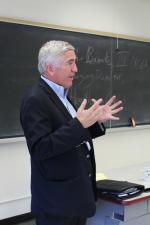Accounting Graduate Drives Disruptive Innovation
November 1, 2016

VCs raise most of their investment capital through pension funds, John told the students in Ginnie Gardiner’s course, Financial Markets and Institutions. Pension funds are limited partners along with endowments, hedge funds, and others. VCs take a 2% annual management fee and return 100% of the original investment back to the limited partners. “I also get 20% in carried interest” [i.e., of the venture fund’s profits, with the remaining 80% returning to the limited partners], he said.
In recent years, consolidation in the medical technology industry has dampened profitability, he continued. Thirty to forty percent of VC investments in the industry, in fact, prove unsuccessful. That incentivizes killing an investment early if it isn’t working. Still, venture capitalists continue to play a vibrant role given their passion for cutting-edge innovation and the financial upside that accompanies technology breakthroughs.
“Diabetes is a global challenge.”Combating the Diabetes Pandemic
Twenty-four years ago, John’s three-year-old son was diagnosed with Type I diabetes. Since then, John has devoted an increasing share of his career to combating the disease and its unsavory consequences. From 2011-2015 he was president and CEO of the world renown Joslin Diabetes Center in Boston, which parlays academic and clinical research from its own medical center to improve state-of-the-art treatment and to effect lifestyle changes that keep diabetics out of hospitals.
As a venture capitalist, John invests in companies that are improving insulin delivery and measurement, developing new insulin analogs, and creating mobile diabetes management systems and solutions. He is also chairman of the College Diabetes Network, which offers peer support, information, and other resources to students with Type I diabetes.
“Diabetes is a global challenge,” John emphasized. China, India, the Caribbean, and other high-incidence areas each have their own ingrained cultural and lifestyle patterns that fuel the problem. One in three people in the Persian Gulf states, he noted, is diabetic, many with related retinal, kidney, and other issues. In the Gulf, diet, obesity, and religious and cultural issues, including fatalism, complicate solutions. One huge problem, he emphasized, is the misconception that “the doctor does it all.” We must counter that with greater reliance on self-management, including the incorporation of wearable and portable smart devices.
Early Career Path
After graduating from Isenberg with a BBA and MS in Accounting, John worked for nine years with Arthur Andersen’s small business group, advising technology businesses and helping them to team up with investors. After Andersen, he played enabling roles with fast-growing developers of surgical devices. In 1997, he cofounded Prism Venture Capital, which went on to manage $1.25 billion in assets, “lots of them,” he said, “in early-stage life sciences ventures.”
For John, the financial numbers alone have never been enough. “I’ve always sought to understand a venture’s real operations to see how everything fits together,” he told the students. “In the 1980s when I was involved with surgical projects like infusion pumps, I would visit hospitals to see how it was done. Over the years, that big-picture, hands-on approach has served me well as an advocate of disruptive innovation.”